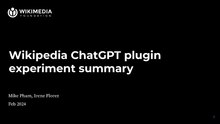Future Audiences/Experiments: conversational/generative AI
| Part of the WMF Annual Plan 23-24 |
| Future Audiences |
|---|
 |
| Objectives & Key Results (Summary) |
| Documents |
| Team |
|
MPinchuk (WMF) – Product lead
|
| Commons category |
Future Audiences Objective 2 Key Result 2: Test a hypothesis around conversational AI knowledge seeking, to explore how people can discover and engage with content from Wikimedia projects.
Rationale[edit]
Large language models (LLMs) and tools/applications built on them – e.g., ChatGPT, Google Bard, Microsoft CoPilot – present both opportunities and risks to our movement. AI/ML technologies have been a part of our movement for over a decade and have assisted human contributors to our projects with, e.g., content translation, vandalism patrol, and structured newcomer tasks. With the latest generation of AI/ML tools, there may be more opportunities to make searching, consuming, and/or contributing to Wikimedia projects easier, more intuitive, and more accessible for more people.
On the other hand, AI assistants may pose a serious risk to the sustainability of our movement if they become primary entry-points for knowledge-seeking if their output does not provide attribution for or pathways to contributing to Wikimedia projects or communities. The may also generate large quantities of low-quality content that could overburden our moderation systems.
There is a high degree of legal, technical, and social complexity to the use of AI within the Wikimedia context, and for this year we are committed to gathering more data and insights to inform how to think about future strategic investments in this space.
Experiments[edit]

Wikipedia ChatGPT plugin[edit]
Hypothesis: If we create a Wikipedia ChatGPT plugin that summarizes content from Wikipedia and attributes/links to our projects, we can better understand how users want to interact with knowledge via AI assistants, and how/whether our content might improve their experience.
[Status: as of 2 February 2023, experiment concluded. Explanation and details]
| Success criteria and results: details | ||||||||||||||||||||||||||||||||||||||||
|---|---|---|---|---|---|---|---|---|---|---|---|---|---|---|---|---|---|---|---|---|---|---|---|---|---|---|---|---|---|---|---|---|---|---|---|---|---|---|---|---|

Preliminary results[edit]
| ||||||||||||||||||||||||||||||||||||||||
"Citation Needed" browser extension[edit]
Hypothesis: If we leverage Wikipedia’s reputation for independence and reliability, making it available across the web, people will use it to verify claims on the internet.
Minimum Viable Product[edit]
As a user of Google Chrome, I can install a browser extension that allows me to:
- Select passages of text I come across on the web
- Receive back information about whether the claim(s) in this text match any relevant content on Wikipedia
Key research questions[edit]
- Do people on the internet want Wikipedia content when not on our website?
- Do people trust Wikipedia content and brand as a reliable source of information?
- Can we reach new audiences? Or create new opportunities for current audiences to use Wikipedia?
"Add A Fact"[edit]
Hypothesis: If we make it easy for off-platform readers to add claims/facts from third-party websites, their contributions can help sustain and grow content in a potential future where most people consume Wikimedia content off-platform.
Key research questions[edit]
- Do people on the internet want to contribute good-faith information to Wikipedia?
- Who are the people who would be interested in doing this? i.e.:
- The general public
- People who are Wikipedian-like in some way – e.g., Reddit moderators, subgroups on the Internet (i.e., fandoms, communities, fact-checkers, etc.)?
- Existing Wikipedians
- How might we deliver these contributions into existing or new pipelines for human review/oversight/addition to Wikipedia?
Other ideas[edit]
If you have more ideas, please leave them on the talk page!
